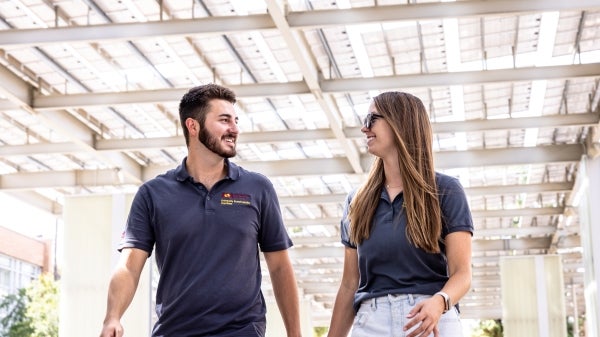Online students embark on lizard anatomy expedition

Using CT scans, students explore the size, shape and structure of the Sceloporus lizards, a large species of spiny lizard abundant throughout Mexico and the Southwestern United States. Photo courtesy the School of Life Sciences
Online undergraduate students at Arizona State University are helping uncover the evolution of lizards local to the desert Southwest through a first-of-its-kind research program.
School of Life Sciences Professor Emilia Martins leads a research opportunity examining CT scans of lizard skeletons through the Online Undergraduate Research Scholars (OURS) program.
Using CT scans, students explore the size, shape and structure of the Sceloporus lizards, a large species of spiny lizard abundant throughout Mexico and the Southwestern United States.
“The software is hard to use at first, but we walk (the students) through the process and provide them with video tutorials,” Martins said. “But it’s commonly used in different research areas. I’ve had students tell me that they could use that knowledge in a clinical setting or get a CT scan done and can understand how to read the output.”
For Juvelyn Hart, a biochemistry and biological sciences student who moved to the U.S. from the Philippines four years ago, engaging in research online has allowed her to gain hands-on experience that will shape her future career trajectory.
“I started in community college and the research was always in the lab,” Hart said. “When I transferred to ASU as an online student, I didn’t know you could research being remote.
“It’s a good opportunity to gain research experience. I want to go to medical school and learn about CT scans and landmarking; that’s one way to look at anatomy.”
In the course, students learn how reptiles play important roles in ecosystems, serving as both predators and prey, pollinators and seed dispersers. However, challenges like climate change threaten their existence.
“Reptiles are threatened. If you look at climate change expectations, we expect 80% of them to be gone in 30 years,” Martins said. “We are trying to identify some of the issues they confront in the wild, and by answering that, we can help them in ways that have the most impact.”
The focus on spiny lizards stems from their abundance and wealth of data. Because of that, researchers can also use them to study animal behavior, reproduction, evolution and biodiversity to save reptiles from extinction.
“These particular lizards are abundant and common,” Martins said. “It’s not just about the lizard. We use the lizards because we have a lot of information about them. But we’re building software and analysis techniques that can be used with any North American plant or animal; it can be applied to anything.”
The research program is an extension of a broader multi-institutional collaboration among ASU, Texas A&M University and the Universidad Nacional de Mexico. At the end of the semester, the students share their research with classmates and present their work to university partners in Texas and Mexico.
The program also includes a mentoring component, led by in-person honors and graduate students to foster a collaborative and active problem-solving and learning environment.
Gaining a full scope of research into the skeletal evolution of lizards requires a considerable time investment, which presents a challenge when working with students who only have a semester to commit to the project. Despite this, Martins recognized the importance of extending the research to online students, even if it meant only involving them for a few months.
“Normally I would have looked to hire some people or picked up some volunteers on campus, but the reality is people can do this work from anywhere,” Martins said. “The College’s support allowed us to recruit and mentor online students, and I’m completely sold on this and hope to continue doing this.”
More Environment and sustainability

Charles Redman, founder of the School of Sustainability, faces a new adventure: Retirement
At the retirement celebration for Charles Redman on Oct. 22, two messages persisted: Redman’s contributions to Arizona State University helped to shape the interdisciplinary efforts we now find…

10 climate insights to guide our future
A group of globally renowned social, natural and climate scientists has once again convened to offer their newest annual synthesis report, “10 New Insights in Climate Science.”The report, published…

The future is green: Job demand translates to high employability for ASU sustainability grads
A 2023 report by Forbes on the state of green jobs confirmed what Arizona State University has been trumpeting for years: Sustainability will play a large part in the new economy.The report suggests…